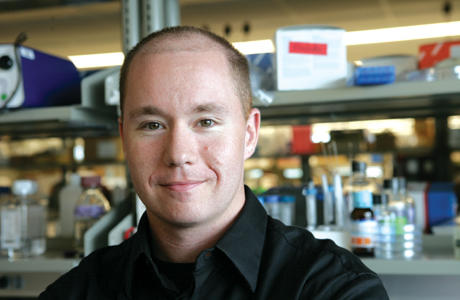Renowned brain tumor pioneer John Ohlfest, Ph.D., dies after his own battle with cancer

It’s a sad time for the University of Minnesota community this week. John Ohlfest, Ph.D., a researcher with the Masonic Cancer Center, University of Minnesota, and first recipient of the Hedberg Family/Children’s Cancer Research Fund Endowed Chair in Brain Tumor Research, passed away on Monday, January 21, 2013, after a battle with malignant melanoma. He was 35 years old. He is survived by his wife, Karen, and their two children.
Ohlfest, the director of the Neurosurgery Gene Therapy Program, and associate professor in the Department of Pediatrics, was a recognized pioneer in the treatment of brain tumors using both gene therapy and novel immunotherapies in an attempt to boost a patient’s own immune system to attack the cancer.
In recent years, his work on brain tumors in dogs also gained national prominence. Ohlfest relied on dogs as a model to test the safety and effectiveness of new treatments prior to their implementation in humans. This model not only served to be more relevant than testing in mice but also gave many family pets a chance for cure. Most importantly, this work gave real hope to patients with brain tumors refractory to conventional therapies.
Ohlfest explored multiple strategies to tackle brain tumors. While his work focused on the development of customized vaccines that would stimulate a patient’s own immune cells to destroy the tumor stem cells (the ‘parent’ cells responsible for tumor growth), he also looked at ways to alter the environment of the brain tumor cells, making it less resistant to therapy. He also was instrumental in the development of new devices to better deliver chemotherapy to the tumor itself.
Since his original research, Ohlfest had also started working toward a “vaccine” for three other types of recurrent brain tumors: glioblastoma, medulloblastoma and ependymoma.
“Dr. Ohlfest was one of the true leaders in cancer research,” said Aaron Friedman, M.D., dean of the Medical School and the University’s vice president of health sciences. “Everyone he came in contact with walked away invigorated about the possibilities of science. His excitement about his work, his appreciation for those with whom he worked and his desire to make a difference are all traits that we will deeply miss.”
Dr. Ohlfest studied molecular biology at Iowa State University and received his B.S. in 2001. He received his Ph.D. at the University of Minnesota in 2004 and joined the faculty of the department of neurosurgery in 2005 and then pediatrics in 2007.
In 2009, Ohlfest and College of Veterinary Medicine surgeon Elizabeth Pluhar, D.V.M., Ph.D., partnered to apply his combination of gene and immunotherapy to a dog named Batman. After removing much of the tumor then administering the vaccine, Batman lived tumor free until passing away from an unrelated condition.
In 2010, Ohlfest partnered with University of Minnesota pediatric oncologist Christopher Moertel, M.D., on a first-in-human clinical trial testing his first vaccine in eight adults. Although short lived, decreases in tumor size and an absence of side effects gave way to second and third generation studies yet to be completed.
“In the field of medicine, John was a star,” said his supervisor John Wagner, M.D., director of the Blood and Marrow Transplant Program and scientific director of the clinical research in the Stem Cell Institute. “He had only one goal in mind—total cure. What John could have accomplished over a long career we will never know—but even now, he continues to inspire us to continue our quest of finding cures for previously incurable diseases.”
For Ohlfest, creating effective therapies for people with brain tumors was an ultimate priority. In graduate school he dedicated himself to fighting brain cancer, realizing that a lack of drugs—and research—was costing people’s lives. One of those was his grandmother, who died from ovarian cancer that metastasized to her brain.
“Brain tumors come back with extreme fury,” Ohlfest said in 2011. “Our work is never enough—not until this is cured.”
In honor of John Ohlfest, an education fund – the Ohlfest Memorial Education Fund – has been established for his children. The fund is through Wells Fargo. To donate, visit any Wells Fargo branch and ask to make a contribution.
- Categories:
- Health




